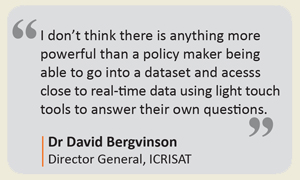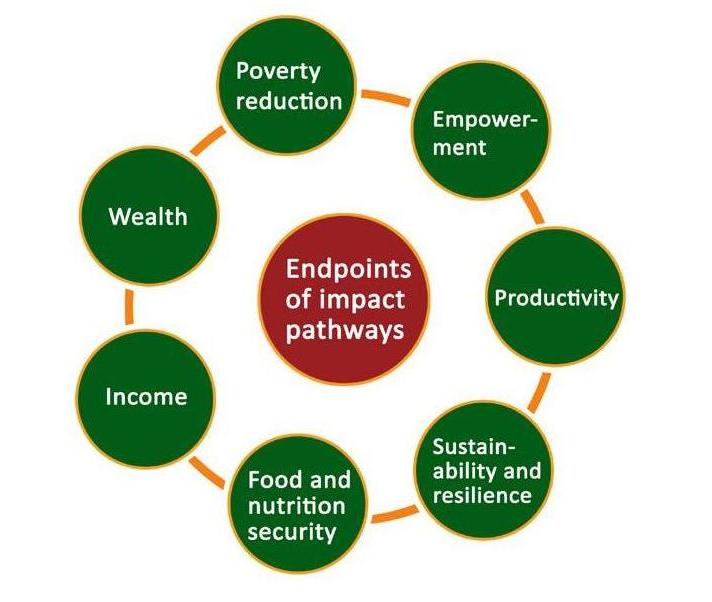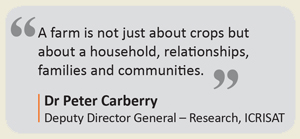The Village Dynamics in South Asia (VDSA) project of ICRISAT is at an inflection point where it is evolving from collecting micro-level data from households to informing decision makers, donors and driving research priorities.
"VDSA is going through an evolution – from largely collecting data in its early stages to now becoming focused on outcomes. How does that data inform policy, inform investments by donors, and how does the data drive research and prioritize biological science research? These are key questions that need to be addressed in Phase II," said Dr David Bergvinson, Director General, ICRISAT.
 The VDSA project, which is transitioning from Phase I to Phase II, has created a database that provides long-term, multi-generational perspective on agricultural, social and economic change in rural areas of South Asia, and provides an extraordinary level of detailed information on farming activities and the household economy.
The VDSA project, which is transitioning from Phase I to Phase II, has created a database that provides long-term, multi-generational perspective on agricultural, social and economic change in rural areas of South Asia, and provides an extraordinary level of detailed information on farming activities and the household economy.
Dr Bergvinson emphasized that several partners, both governments and donors, had brought up the value of VDSA data in informing policy – be it the Department for International Development (DFID), International Fund for Agricultural Development (IFAD), the World Bank and others. “VDSA data can be used to guide policy in South Asia and serve as a model for other parts of the developing world,” he said.
At the end of two days of review and deliberations during the VDSA annual review meeting it was agreed that VDSA Phase II should:
- Strengthen understanding of household behavior under risk and other household dynamics in crop, crop-fish, and crop-livestock production systems.
- Generate new metrics and methodologies for understanding development pathways and endpoints of impact pathways, namely, productivity, income, wealth (human, physical, social and environmental capital), poverty reduction, food and nutrition security, empowerment (gender, age, caste and class), sustainability and resilience (economic, environmental and social).
- Include more villages in eastern India and Bangladesh to represent all agro-ecological zones and include locations of common interests with other CGIAR Research Programs (CRPs) in the region.
- Modernize the data collection mechanism using and integrating with remote sensing data, including more information related to natural resources like land and water. This also necessitates working in consortia mode to make the data more relevant and appropriate for clientele like government, research institutions and the private sector.
- Aim to provide data, insights and policy recommendations at the click of a button.
At the review meeting, the seminal contributions of Dr Tom Walker, member of the VDSA Advisory Committee and pioneer of VDSA, were acknowledged. The project (then known as Village Level Studies) began in 1975 with six villages and has currently expanded to 42 villages in India and Bangladesh.
Dr Cynthia Bantilan, VDSA Project Leader and Director of Research Program on Markets, Institutions and Policies at ICRISAT briefed the gathering about the major achievements of the project. The project has been successful in knowledge generation, capacity building, and development of household and district level databases, providing access to the databases to a wide group of users, and helped in research priority setting. The databases have been used by more than 850 users from 43 countries including 229 PhD students and 159 other students from 150 universities/institutes across the globe.
 |
| End Points of Impact Pathways |
Some of the striking insights generated through the VDSA project include:
- Rapid transformation in rural economies in both Bangladesh and India and their underlying forces,
- Changes in rural labor markets and widening of male-female wage in agriculture intensive villages,
- Farmers response to rise in agricultural wage, Mismatch between aggregate level and village level participation rates of female workers in agriculture,
- Response of farmers to new opportunities, technologies and favorable policy changes, and access to markets which have substantially increased their income,
- Proof that increase in income does not necessarily lead to increase in nutritional outcome, and
- Feminization of agricultural labor is increasing, as male members migrate for non-farm employment opportunities.
Mr Tuu-Van Nguyen, Program Officer, Bill & Melinda Gates Foundation, suggested that combining VDSA data with other datasets, like Geographic Information Systems data, is important to strengthen its value and use. He added that in the next phase, VDSA should focus on development of knowledge products and provide recommendations on actionable agendas in agricultural research strategies.
 Highlighting the demand for VDSA in Bangladesh, Dr Samarendu Mohanty, Head, Social Sciences Division, International Rice Research Institute (IRRI), suggested that the VDSA can serve as a platform for several CRPs like Global Rice Science Partnership (GRiSP), Dryland Cereals, Grain Legumes and serve the critical needs of these CRPs in south Asia for monitoring, learning and evaluation.
Highlighting the demand for VDSA in Bangladesh, Dr Samarendu Mohanty, Head, Social Sciences Division, International Rice Research Institute (IRRI), suggested that the VDSA can serve as a platform for several CRPs like Global Rice Science Partnership (GRiSP), Dryland Cereals, Grain Legumes and serve the critical needs of these CRPs in south Asia for monitoring, learning and evaluation.
Dr PK Joshi, Director, International Food Policy Research Institute - South Asia, said, “The future success of VDSA depends upon analytically showcasing the pathways for prosperity, capturing drivers of change in rural transformation, connecting the dots from ground level to policy implementation, communicating to the target audience appropriately, capacity building in data collection to data analysis and reporting, and conducting timely and relevant policy advocacy workshops.”
Applauding the successful partnership with the Indian Council of Agricultural Research (ICAR) institutes Dr SK Chaudhari, Assistant Director General (SWM), ICAR, suggested that more ICAR institutes and state agricultural universities need to be included in future implementation of the project.
Dr Ramesh Chand, Director, National Institute for Agricultural Economics and Policy Research (NIAP), emphasized that market is the most important driver of change and the private sector is an important stakeholder of the VDSA project.
Dr SK Ambast, Director, Indian Institute of Water Management (IIWM), emphasized the need for a special purpose survey on soil and water management in the VDSA villages and their implications for policies and strategies towards sustainable management of soil and water resources.
The 6th Annual Review Meeting of the Village Dynamics in South Asia project was held at ICRISAT India on 2-3 April.
Partners: IRRI & Socio-Consult, Bangladesh, ICAR-RCER, IIWM, NIAP and ICRISAT, India
Investor: Bill & Melinda Gates Foundation